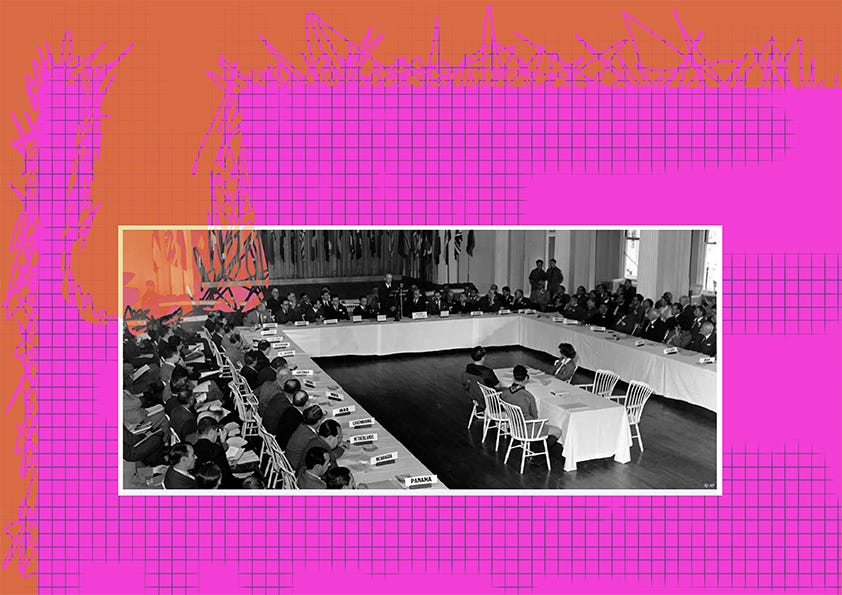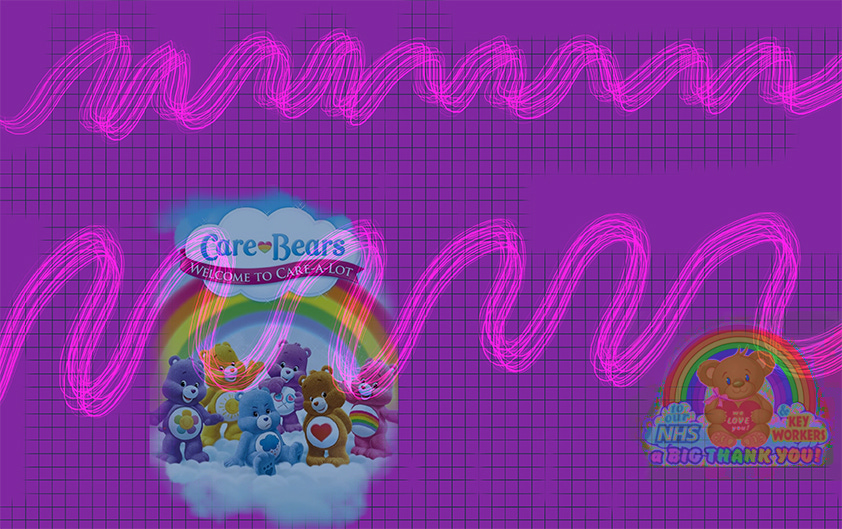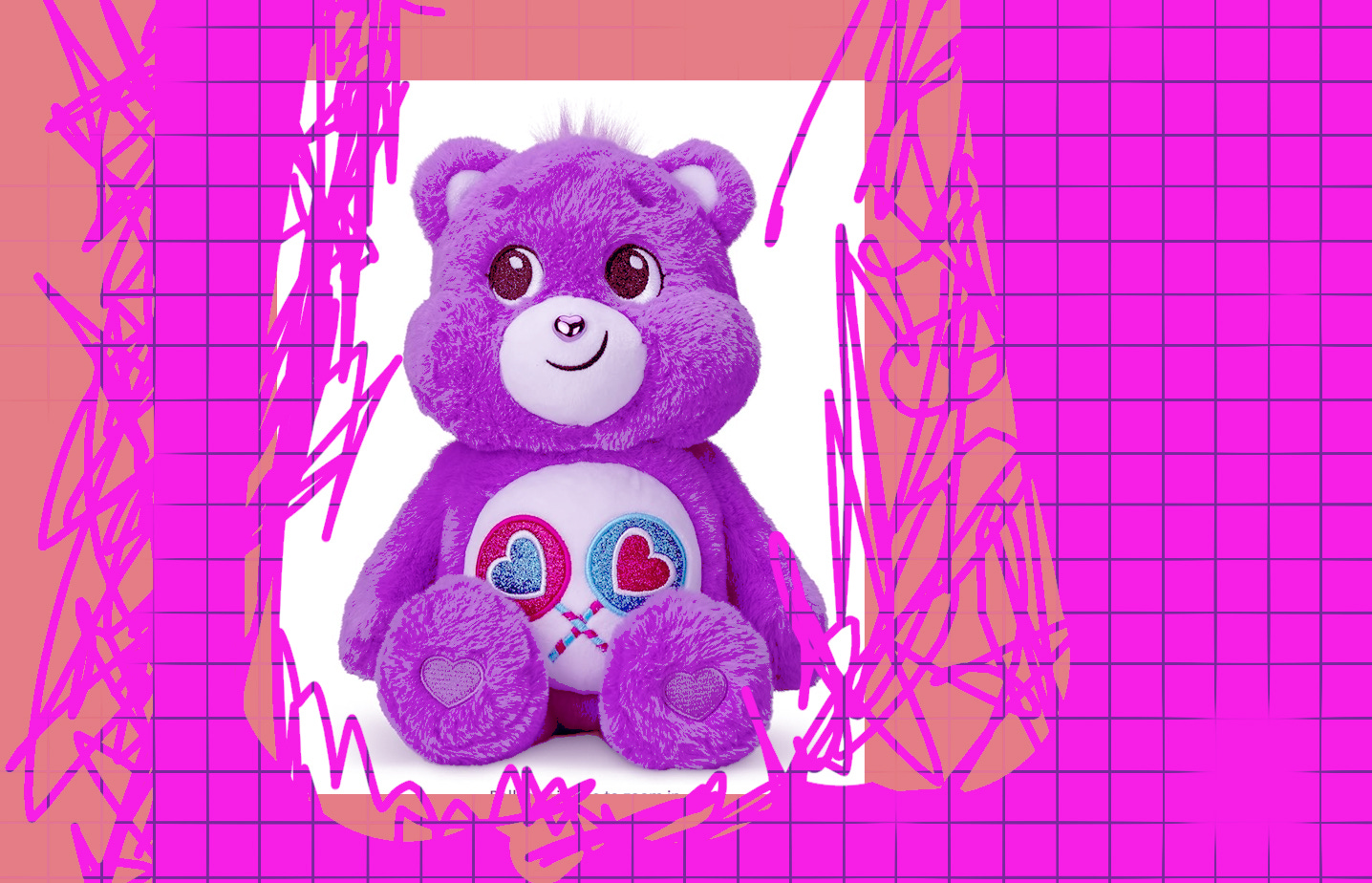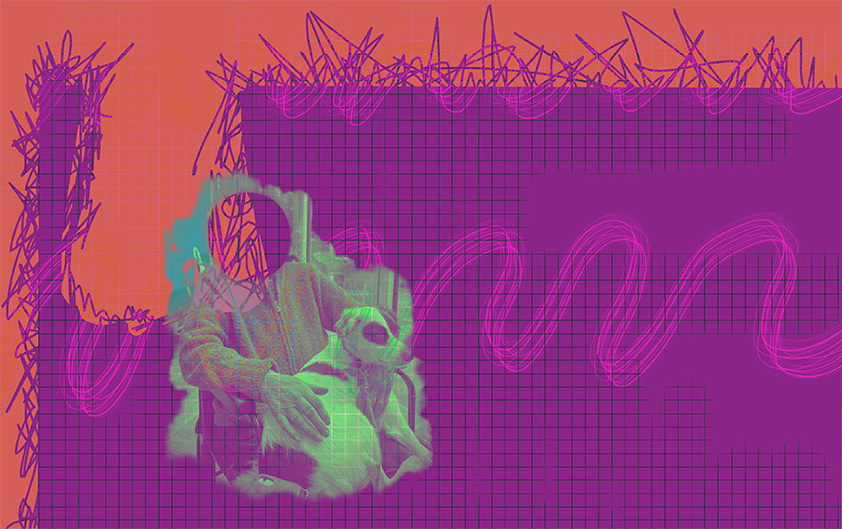Welcome to Care-a-Lot ... Care full now, you don't want to get stuck here.
Why the GDP contributes to low status for highly valuable labour
I have a care cave at my core, do you? Meaning, I am woman and have all the necessary biology bits to grow a human or four should I choose to. I did in fact choose to. Long ago and when I was someone else entirely. I liked her, the young woman who chose to; she had good intentions. But she wasn’t fully conscious of the place she might end up. The land of Care-a-Lot.
You may or may not have heard of Care-a-Lot but there’s a good chance you’re going to go there at some point in your life. I’ll explain.
I wrote about having a care cave recently, and in an ironic context, to a close friend. At the time, I was feeling all the big and contradictory feelings about providing so much care. The pride and privilege of it, intense joy and yet also massive frustrations and marginalisation.
I decided though, that ‘care cave’ sounds too much like a bleak, dark, lonely and passive place. Somewhere you might feel stranded, cut off, stuck and begin to worry and lose yourself, like when you’re potholing and the journey is torchlit and extremely slow and cumbersome. Disconnected. Care-giving can absolutely resemble a cavernous and solitary place at times. With all the associated social isolation it brings, be it in the care for a small child, a disabled sibling, an incapacitated partner or an aging parent.
And if your brain even once interpreted care cave as a euphemism for my vagina, then back right up and outta there, that is not where I’m taking you with all this.
Then I revised the initial metaphor to ‘care caldera’. I like this image much more. It screams surging portal of life energy and creation. Which is absolutely what these last two decades as a carer have taught me burns deep inside my bones.
A caldera is the cauldron-like hollow through which hot magma violently flows within a volcano. A hugely productive and energetically formative place. Dangerous though, a fiery furnace.
When we’re standing in a silent circle, under the rack of timber roof beams of the village hall, feet on mats, eyes closed and with our hands making a diamond shape in front of our abdomen, the yoga teacher asks us to visualise and connect with the fire in our belly.
Steadied and breathing in the incense, I can easily see and feel the imagined warm flames licking at my rib cage and, in turn, visualise the whole group, all of us with a panel of blazing flames striping up over our lycra-smoothened bellies. Crackling and glowing orange circles. Like those jaunty bear toys of the 80’s, each with a distinguishing emblem across their middle to identify their personality. We’re a circle of ‘Fire Belly’ Care Bears is what we are standing there.
It’s not that I don’t remember them, I absolutely do, but I didn’t have one of my own, a Care Bear. My sister did, she’s a couple of years younger and stifled feelings of coveting her toys are still a big memory of mine.
Share Bear, I think, was her bear, her one Care Bear. This was the 80’s and the North of England after all; a time when you really did actually have one of things rather than grotesque excesses and multiples of everything like now.
Each of the Care bears had / have - they’re still in circulation out there - a motif decorating their fuzzy belly, Share Bear’s being two brightly-coloured, glittery lollipops.
This Bear of my sister’s was so incredibly soft and squashy and in complete contrast to the rigid-limbed, noisy to squeeze teddy of pastel pink, polyester-filled tat that had been my stiff bedtime buddy. Share Bear was so plush and squidgy. I’m guessing she was given it at Christmas time which I wrote recently about here. And perhaps the same year that my big gift was the typewriter which landed well enough but had zero cuddle appeal.
The Care Bears live in a faraway place up in the clouds called Care-a-Lot and the (animated) series centres on seven colourful bears who travel around the world on Missions of Caring (for humans) whilst evil villains such as Lord No Heart, try to thwart their plans.
I just had myself a wiki looki to check benevolent bear facts and heaved a big 70’s kid sigh of relief to have missed out on such a load of garish, ursine guff (sorry CB fan cubs). This is Share Bear’s character profile.
If Share (Bear) has it, she'll share it with anyone. Carefree and loving, Share is happiest whenever she's with her friends, serving tea or baking. She has a penchant for baking treats. She lives in a tree house in the Forest of Feelings.
Hold up, she lives where you say? In the actual ‘Forest of Feelings’ ? I am laughing hard at this marketing excellence. The lamentable weight of female conditioning right there, it’s enough to prompt any psychologist’s shoulders down into an immediate and dramatic hard slump. Quite the little people pleasey, good girl’s allegory.
Originally a series in the 80’s, I suspect it’s a pure barf stream of gaudy, technicolour toxic positivity though absolutely do not volunteer myself for any deep delve watching of episodes to either confirm or discount this theory. A spin off series followed in 2015 and lots of CB merch’ing. You’ve seen the tee shirts. I watched three seconds of the most recent animation and liken it to consuming a vat of visual candy floss. My head hurt and queasy would be my review.
I took my youngest and dog to visit an elderly friend this afternoon. The chunky stone steps at the entrance arresting us with their deep, vital, blood red masonry paint. As we meandered our way through the corridor maze of striped carpet over creaky Edwardian villa floorboards and past a dozen or so open bedroom doors, as we turned corner upon corner, I tried not to peer in and willed Jake not to also. Not wanting to intrude and make eye contact with the faces propped up atop of the biscuit-coloured blankets. Staff jostled past us in each direction, rustling in their blue plastic throwaway aprons.
Out of the corner of my eyes, I noticed the eyes in the dimly lit bedrooms register our small dog trotting alongside me at my ankles as we walked by. Flutters of excitement, sudden jerks of wrist and micro expressions illuminating faces in the shadows.
And I noticed how several of the beds had a teddy bear resting on them alongside the frail human face.
The friend we’d come to visit has not long become a resident in this nursing home. She’s of sound mind and in her ninth decade. A woman who has lived so many adventures and had several professions along the long way. Her body can though, now no longer support her in any mobility.
This woman I’ve come to know with the impressive verve and mojo, this will be her final adventure and she’s ardently engaged in making her peace with the inevitable loss of agency, liberty and movement of this new infirmity and impending ending. Now her challenge is adjustment to becoming the person cared for, the receiver of the care.
At one time, and before our friendship began, she was caring for her husband with dementia for years, then also caring for her twin sister with dementia for yet more years. She’s also raised two children and for fifteen winters cared for a dog until the year of the pandemic. That’s a lot of care for one woman.
A lot of care for one woman to perform is what I almost wrote here. And then I’m reflecting on this verb a moment because to perform suggests it’s not an entirely genuine act. A performance, inferring not real.
And certainly, yes, there definitely can be an element of performance within this act of caring, when unexamined, because care is not who we are, care is a role we play. And a role we can absolutely become stuck in.
Leaving that nursing home I felt relief and lightness yet also fear and uncertainty about how much capacity or desire I will be able to summon in the future when it arrives. To care yet more than now. And I remembered the desperation and defiance I once felt to forge paid work into difficult caring circumstances; that felt a deep trench to clamber up and out of and I am afraid of ever falling so hard again and needing to scrabble so hard.
There is immense societal expectation that women bear care upon their shoulders. It is silently and culturally assumed that we gals - living in our lush, green, other-centred ‘forest of feelings’ where else - will show up and simply glide swanlike into the vacancy whenever the need to provide care presents. Doh, slaps palm against own forehead.
This riles me. It rankles me. Enormously. Because care-giving holds absolutely no value in our culture. Nada.
There is more energetically of economic value in our society in an act of theft or human-trafficking than in an act of care.
If your metric is a country’s per capita GDP that is. Which it regrettably is and everywhere has been since conceived of by a bunch of white, middle-aged men in 1944 when, as World War II drew to a close with victory for the Allies, senior finance officials from 44 countries huddled in a luxury hotel in Bretton Woods, New Hampshire, USA to put in place the post-war economic order.
There they conceived of GDP which stands for Greedy Dollar-grabbing Patriarchy Gross Domestic Product. It is Gross, by the way, and you’ll see why in a minute and especially if you’re a woman.
Take a look at the picture below. We are in the room, though only just - to document our disappearance? - and certainly not to be included in any of the decision-making.

It shouldn’t be any surprise whatsoever looking at this photo that women come out of this economic order very badly. That all the unpaid work and activities we participate in each day, not uniquely women yet also particularly women, do not count at all in the way we measure the alleged success of the very lands we live in.
Those men back when created a boundary of production to measure everything that involves a market transaction. The thing is, rather a chunky amount of necessary life activity is unpaid and therefore completely omitted / disappeared / vamooshed from the pyramids of patriarchal economic measure.
When we look at the amount of time that's taken in the unpaid sector, what we find is that in almost every country where I've ever seen the data, it is the single largest sector of the nation's economy.1
How does this system remain unquestioned ? How can so much human activity be economically invisibilised? The low status of care role work is one hundred percent sensed and communicated and carers stigmatised by association.
A number of years ago, I watched economist Marilyn Waring's TED Talk on the unpaid care that GDP ignores and I’ve rewatched it many times since. At moments it is very amusing; she delivers her message with great humour, especially the part where she’s retelling how President Sarkozy instructed three men who had all won Nobel Prizes in Economics -Sen, Fitoussi and Stiglitz - to discover what she had already written about 30 years ago. She’s a witty gal, is Marilyn.
Yet this is a desperately solemn interrogation on the sizeable failings of a narrow-minded, archaic system which 75 years since its ‘inception’ continues to fail women and to fail the planet alike.
Here’s a quick snippet of why its rubbish for women specifically and there are plenty more examples in Marilyn’s Talk …
Now, how about the women who have been pregnant and who have had children? Yes. Now, I really hate to tell you this, because it might well have been hard labour, but at that moment, you were unproductive.
And some of you may have breastfed your infant. Now, in the New Zealand national accounts - that's what the figures are called, that's where we get the GDP - in the New Zealand national accounts, the milk of buffalo, goats, sheep and cows is of value but not human breast milk.
Well, as far as economics is concerned, you were at leisure.
Same applies to a bit of tidying up the kitchen, shopping for members of the household, preparing food, cleaning up afterwards, doing laundry or driving people between places. Fairly cruddy all this, isn’t it?
And here’s why it’s atrocious for the planet too …
Now, it might also be becoming obvious to you that this boundary of production works in terms of our environment. When we're mining it, when we're deforesting, when we're deleting our environment, when we're fishing out our marine resources, legal or illegal, as long as market is exchanged, it's all good for growth. To leave our natural environment alone, to sustain it, to protect it, is apparently worth nothing.2
Empathy is the double-edged sword we’re, as females, simultaneously lauded for and then left to quietly die on. Participating in life’s biggest human experiences demands empathy and a considerable amount of the stuff.
Unpaid caring is labour, it’s some of the most at times gruelling work, and yet is cloaks those of us who do it with a giant invisibility cape. It’s a sick society that doesn’t value sustenance and acknowledge the arms that hold and steady and stabilise.
A friend shared these words with me which RFK delivered (the original OG not the current 🤓 ) during his 1968 speech to students at the University of Kansas …
“… that Gross National Product counts air pollution and cigarette advertising, and ambulances to clear our highways of carnage. It counts special locks for our doors and the jails for the people who break them. It counts the destruction of the redwood and the loss of our natural wonder in chaotic sprawl. It counts napalm and counts nuclear warheads and armored cars for the police to fight the riots in our cities. It counts Whitman's rifle and Speck's knife, and the television programs which glorify violence in order to sell toys to our children.
Yet the gross national product does not allow for the health of our children, the quality of their education or the joy of their play. It does not include the beauty of our poetry or the strength of our marriages, the intelligence of our public debate or the integrity of our public officials. It measures neither our wit nor our courage, neither our wisdom nor our learning, neither our compassion nor our devotion to our country, it measures everything in short, except that which makes life worthwhile.There is no giant rainbow of colour arching above the Care-a-Lot land I inhabit. I see that ever more clearly. Marilyn Waring proposes a systemic order which measures time usage to account for economic activities and thereby include much that is currently omitted.”
I am going to bed tonight - cuddling the dog not any bear - and hope to dream of such a place, where care work is considered and all those participating in it are readmitted to our economic ordering.








Wow, all of this! I am a carer too, and could write an essay of a response, except it's gone past midnight, and I have to sleep so I can get my profoundly disabled daughter out of bed in the morning, fed, washed, dressed, medicated, and I'm tired already just thinking about it. But it's OK, I do it for love... which of course I do. I love the bloody bones of her. But it's still hard, and who cares, anyway? Only the carer. Me. Thanks for writing this. 💕